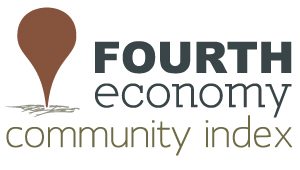 Durham was recently recognized for being #1 in the nation by the Fourth Economy Community Index's top 10 large-sized Fourth Economy Communities. The recognized communities are ideally positioned to attract modern investment and managed economic growth.
Durham was recently recognized for being #1 in the nation by the Fourth Economy Community Index's top 10 large-sized Fourth Economy Communities. The recognized communities are ideally positioned to attract modern investment and managed economic growth.The “fourth economy” characterizes the most recent phase of our nation’s economy, reflecting a combination of the previous three to include agrarian, industrial, and technological. This new index is intended to serve as a dashboard for community stakeholders to gauge their capacity to attract and retain modern investment.
“There has never been a more important time for economic and community developers to rethink how we measure economic success,” said Rich Overmoyer, CEO of Fourth Economy Consulting, the economic development firm that created the index in 2011. “As a country, it is critical that we position our communities to take advantage of the long term economic prosperity and impact that both the public and private sectors can have on their respective economies. This index begins to point to the data and assets that help to influence and monitor progress toward that goal,” Overmoyer added.
Fourth had this to say about Durham:
"Leading the large county index is highly popular Durham County, North Carolina, home to Duke University, a historic downtown center, and a booming technological prowess, all with an unmistakable Southern charm.
Durham County has been long ahead of the game when it comes to research and development, capitalizing upon its wealth of academic resources and potential for discovery. Home to one of the nation’s most competitive universities and major technology playground, Research Triangle Park, companies such as IBM, Cisco, NetApp, and their research teams have taken root in the area, creating a demand for manufacturing expertise and a technology industry that supports that growth.
The city mobilized its efforts in attracting entrepreneurs by creating a built environment that facilitates investment, bringing a newfound vitality to downtown Durham. Focusing upon Durham’s potential as a prime start-up environment, the city invested in marketing to the businesses, offering services like Smoffice and The Bull City Startups. These tactics have been incredibly successful, bringing eighty start-ups in three years and creating 600 jobs.
“We do entrepreneurial activity much better than most. Our secret sauce is—create the environment, invite them to try it, and get out of the way. We play in keeping the ecosystem vibrant and allow them to use it to grow organically,” says Casey Steinbacher of the Greater Durham Chamber of Commerce. “We are an incredibly diverse and welcoming community that values diversity of people and thoughts so new ideas do well here”.
Durham County boasts a quality of life that many counties of its size envy. As the economy diversifies, focus swings to improvements for charter schools and more youth programs. As a result, those unconnected to business lead better lives as well, creating a well-rounded approach to fourth economy development."About the Index:
The Fourth Economy Community Index (www.fourtheconomyindex.com or #FECIndex) categorizes counties based on their Census 2010 population. Micro counties are those less than 25,000. Small counties range from 25,000 to 49,999. Mid-sized counties are 50,000 to 149,999. The large counties are between 150,000 and 499,999. The FEC Index then considers several county-level measures within five areas: 1) Investment, 2) Talent, 3) Sustainability, 4) Place, and 5) Diversity. These five areas serve as a foundation for future economic success. Specific indicators include wage and employment growth, education levels, drive times, home values, minority business ownership, agricultural and manufacturing capacity and population density. The measures are then weighted based on the level of influence they have on both internal and external investment decisions.
For more information on economic growth in Durham, read more at the Durham News Service. For a current inventory of new developments happening in Durham, click here.

No comments:
Post a Comment